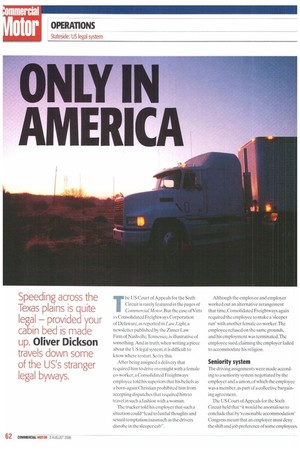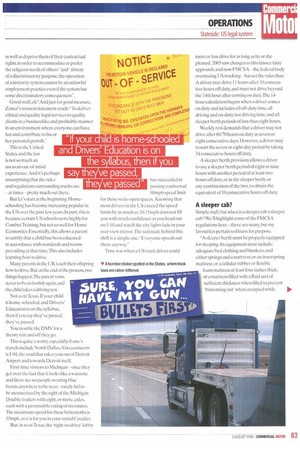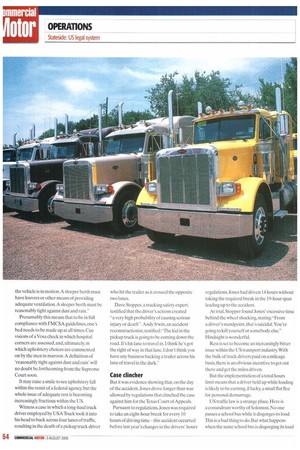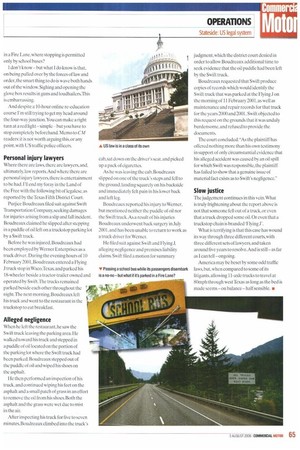Speeding across the Texas plains is quite
Page 62

Page 63

Page 64

Page 65

If you've noticed an error in this article please click here to report it so we can fix it.
legal — provided your
cabin bed is made
up. Oliver Dickson
travels down some of the US's stranger legal byways.
The US Court of Appeals for the Sixth Circuit is rarely featured in the pages of Commercial Motor. But the case of Virts vs Consolidated Freightways Corporation of Delaware, as reported in Law Light. a newsletter published by the Zinser Law Firm of Nashville,Tennessee, is illustrative of something. And in truth, when writing a piece about the US legal system, it is difficult to know where to start. So try this.
After being assigned a delivery that required him to drive overnight with a female co-worker, a Consolidated Freightways employee told his superiors that his beliefs as a born-again Christian prohibited him from accepting dispatches that required him to travel in such a fashion with a woman.
The trucker told his employer that such a situation could "lead to lustful thoughts and sexual temptation inasmuch as the drivers disrobe in the sleeper cab". Although the employee and employer worked out an alternative arrangement that time, Consolidated Freightways again required the employee to make a 'sleeper run' with another female co-worker.The employee refused on the same grounds, and his employment was terminated.The employee sued, claiming the employer failed to accommodate his religion.
Seniority system
The driving assignments were made according to a seniority system negotiated by the employer and a union, of which the employee was a member, as part of a collective bargaining agreement.
The US Court of Appeals for the Sixth Circuit held that "it would be anomalous to conclude that by 'reasonable accommodation' Congress meant that an employer must deny the shift ancljob preference of some employees, as well as deprive them of their contractual rights, in order to accommodate or prefer the religious needs of others" and "absent of a discriminatory purpose, the operation of a seniority system cannot be an unlawful employment practice even if the system has some discriminatory consequences".
Good stuff, eh? And just for good measure. Zinser's mission statement reads: "To deliver ethical and quality legal services to quality clients in a businesslike and profitable manner in an environment where everyone can have fun and contribute to his or her personal growth."
This is the United States, and the law is not so much an ass as an out-of-mind experience. And it's perhaps unsurprising that the rules and regulations surrounding trucks are — at times — pretty much out there.
But let's start at the beginning. Homeschooling has become increasing popular in the US over the past few years. In part, this is because certain US schools score highly for Combat Training, but not so well for Home Economics. Essentially, this allows a parent to certify that a child has been educated in accordance with standards and norms prevailing at that time. This also includes learning how to drive.
Many parents in the UK teach their offspring how to drive. But, at the end of the process, two things happen.The parent vows never to be so foolish again, and the child takes a driving test.
Not so in Texas. If your child is home-schooled, and Drivers' Education is on the syllabus, then if you say they've passed, they've passed.
You trouble the DMV for a theory test and off they go.
This is quite a worry, especially if one's travels include North Dallas.Also a concern is 1-94, the road that takes you out of Detroit Airport and towards Detroit itself.
First-time visitors to Michigan — Once they get over the fact that it looks like a warzone and there are no people wearing blue berets anywhere to be seen —rarely fail to be mesmerized by the sight of the Michigan Double: trailers with eight, or more, axles, each with a permissible rating of six tonnes. The maximum speed for these behemoths is 55mph, as it is for you in your rental Cavalier.
But, in west Texas, the 'right-to-drive' lobby has succeeded in passing a universal 80mph speed limit for those wide-open spaces. Knowing that most drivers in the US exceed the speed limits by as much as 10-15mph does not fill you with much confidence as you head out on 1-10 and watch the city lights fade in your rear-view mirror.The rationale behind this shift is a simple one. Everyone speeds out there anyway."
Time was when a US truck driver could more or less drive for as long as he or she pleased. 2005 saw changes to this laissez-faire approach, and now FMCSA —the federal body overseeing US trucking — has set the rules thus: A driver may drive ii hours after 10 consecutive hours off duty, and must not drive beyond the 14th hour after coming on duty.The 14hour calculation begins when a driver comes on duty and includes all off-duty time, all driving and on-duty/not driving time, and all sleeper berth periods of less than eight hours.
Weekly rest demands that a driver may not drive after 60170 hours on duty in seven or eight consecutive days. However, a driver may restart the seven or eight-day period by taking 34 consecutive hours off duty.
A sleeper berth provision allows a driver to use a sleeper berth period of eight or nine hours with another period of at least two hours off duty, or in the sleeper berth. or any combination of the two, to obtain the equivalent of 10 consecutive hours off duty.
A sleeper cab?
Simple stuff; but when is a sleeper cab a sleeper cab'? We'll highlight some of the FMCSA regulations here — there are many, but my favourites pertain to fitness for purpose.
"A sleeper berth must be properly equipped for sleeping. Its equipment must include: adequate bed clothing and blankets: and either springs and a mattress; or an innerspring mattress; or a cellular rubber or flexible foam mattress at least four inches thick; or a mattress filled with a fluid and of sufficient thickness when filled to prevent 'bottoming outwhen occupied while the vehicle is in motion.A sleeper berth must have louvres or other means of providing adequate ventilation.A sleeper berth must be reasonably tight against dust and rain."
Presumably this means that to he in full compliance with FMCSA guidelines, one's bed needs to be made up at all times. Cue visions of a Vosa check in which hospital corners are assessed, and, ultimately, in which upholstery choices are commented on by the men in maroon.A definition of 'reasonably tight against dust and rain' will no doubt be forthcoming from the Supreme Court soon.
It may raise a smile to see upholstery fall within the remit of a federal agency, but the whole issue of adequate rest is becoming increasingly fractious within the US.
Witness a case in which a long-haul truck driver employed by LISA Truck took it into his head to back across four lanes of traffic, resulting in the death of a pickup truck driver who hit the trailer as it crossed the opposite two lanes.
Dave Stopper, a trucking safety expert, testified that the driver's actions created "a very high probability of causing serious injury or death". Andy Irwin, an accident reconstructionist,testified:"The kid in the pickup truck is going to becoming down the road. It's his lane to travel in. I think he's got the right of way in that lane. I don't think you have any business backing a trailer across his lane of travel in the dark.
Case clincher
But it was evidence showing that, on the day of the accident.Jones drove longer than was allowed by regulations that clinched the case against him for the Texas Court of Appeals.
Pursuant to regulations, Jones was required to take an eight-hour break for every 10 hours of driving time this accident occurred before last year's changes in the drivers' hours regulations. Jones had driven 14 hours without taking the required break in the 19-hour span leading up to the accident.
At trial, Stopper found Jones' excessive time behind the wheel shocking, stating: "From a driver's standpoint, that's suicidal.You're going to kill yourself or somebody else." Hindsight is wonderful.
Rest is set to become an increasingly bitter issue within the US transport industry. With the bulk of truck drivers paid on a mileage basis, there is an obvious incentive to get out there and get the miles driven.
But the implementation of a total hours limit means that a driver held up while loading is likely to be earning, if lucky, a small flat flee for personal demurrage.
US traffic law is a strange place. Here is a conundrum worthy of Solomon. No one passes a school bus while it disgorges its load. This is a bad thing to do. But what happens when the same school bus is disgorging its load in a Fire Lane, where stopping is permitted only by school buses?
I don't know— but what I do know is that, on being pulled over by the forces of law and order, the smart thing to do is wave both hands out of the window. Sighing and opening the glove box results in guns and loudhailers.This is embarrassing.
And despite a 10-hour online re-education course I'm still trying to get my head around the four-way junction. You can make a right turn at a red light —simple —but you have to stop completely beforehand. Memo to CM readers: it is not worth arguing this, or any point,with US traffic police officers.
Personal injury lawyers
Where there are laws, there are lawyers, and, ultimately, law reports. And where there are personal injury lawyers, there is entertainment to be had. I'll end my foray in the Land of the Free with the following bit of legalese, as reported by the Texas Fifth District Court.
Purjice Boudreaux filed suit against Swift Transportation Company, seeking damages for injuries arising from a slip and fall incident. Boudreaux claimed he slipped after stepping in a puddle of oil left on a truckstop parking lot by a Swift truck.
Before he was injured. Boudreaux had been employed by Werner Enterprises as a truck driver. During the evening hours of 10 February 2001, Boudreaux entered a Flying J truck stop in Waco.Texas, and parked his 18-wheeler beside a tractor-trailer owned and operated by Swift.The trucks remained parked beside each other throughout the night.The next morning, Boudreaux left his truck and went to the restaurant in the truckstop to eat breakfast.
Alleged negligence
When he left the restaurant, he saw the Swift truck leaving the parking area. He walked toward his truck and stepped in a puddle of oil located on the portion of the parking lot where the Swift truck had been parked. Boudreaux stepped out of the puddle of oil and wiped his shoes on the asphalt.
He then performed an inspection of his truck, and continued wiping his feet on the asphalt and a small patch of grass in an effort to remove the oil from his shoes Both the asphalt and the grass were wet due to mist in the air.
After inspecting his truck for five to seven minutes, Boudreaux climbed into the truck's cab, sat down on the driver's seat, and picked up a pack of cigarettes.
As he was leaving the cab, Boudreaux slipped on one of the truck's steps and fell to the ground landing squarely on his backside and immediately felt pain in his lower back and left leg.
Boudreaux reported his injury to Werner, but mentioned neither the puddle of oil nor the Swift truck.As a result of his injuries Boudreaux underwent back surgery in July 2001, and has been unable to return to work as a truck driver for Werner.
He filed suit against Swift and Flying J, alleging negligence and premises liability claims. Swift filed a motion for summary judgment,which the district court denied in order to allow Boudreaux additional time to seek evidence that the oil puddle had been left by the Swift truck.
Boudreaux requested that Swift produce copies of records which would identify the Swift truck that was parked at the Flying Jon the morning of 11 February 2001, as well as maintenance and repair records for that truck for the years 20(X) and 2001. Swift objected to this request on the grounds that it was unduly burdensome, and refused to provide the documents.
The court concluded: "As the plaintiff has offered nothing more than his own testimony in support of only circumstantial evidence that his alleged accident was caused by an oil spill for which Swift was responsible, the plaintiff has failed to show that a genuine issue of material fact exists as to Swift's negligence."
Slow justice
The judgement continues in this vein. What is truly frightening about the report above is not that someone fell out of a truck, or even that a truck dropped some oil. Or even that a truckstop chain is branded 'Flying J'. What is terrifying is that this case has wound its way through three different courts, with three different sets of lawyers. and taken around five years to resolve.And is still— as far as I can tell —ongoing.
America may be beset by some odd traffic laws, but, when compared to some of its litigants. allowing 11-axle trucks to travel at 80mph through west Texas as long as the bed is made seems —on balance—half sensible. •




























































































































































































